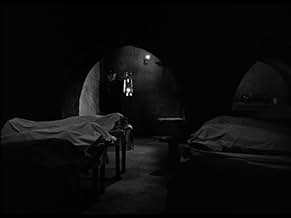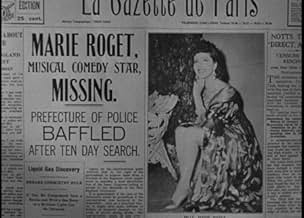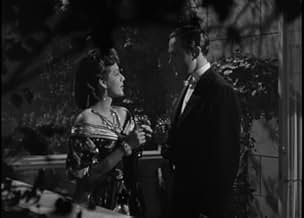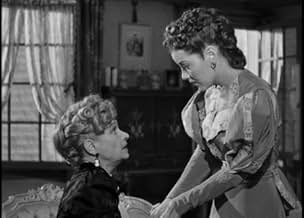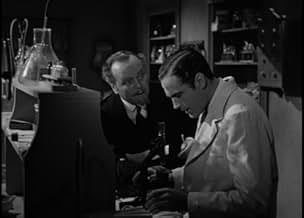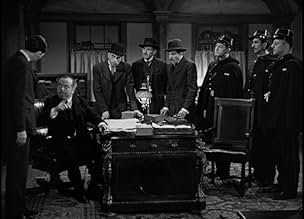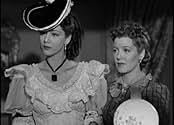A detective tries to unravel the strange circumstances surrounding the death of a young actress.A detective tries to unravel the strange circumstances surrounding the death of a young actress.A detective tries to unravel the strange circumstances surrounding the death of a young actress.
Paul E. Burns
- Gardener
- (as Paul Burns)
William Ruhl
- Detective
- (as Bill Ruhl)
Raymond Bailey
- Gendarme
- (uncredited)
Joseph E. Bernard
- Man
- (uncredited)
Paul Bryar
- Detective
- (uncredited)
Caroline Frances Cooke
- Woman
- (uncredited)
- Director
- Writers
- All cast & crew
- Production, box office & more at IMDbPro
Storyline
Did you know
- TriviaThe original Edgar Allan Poe story is based on the real-life murder of Mary Cecilia Rogers, who was found floating in the Hudson River near Weehawken, NJ. Poe transplanted the events to Paris and placed the case in the hands of amateur detective C. Auguste Dupin. In a weird twist, Poe's ultimate conclusion as to the circumstances of the crime were proved correct when the murderers confessed well after "The Mystery of Marie Roget" was published.
- Quotes
M. Henri Beauvais: Dupin? You had something to do with those murders in the Rue Morgue didn't you?
Prefect Gobelin: Something to do? Monsieur, Dr. Dupin practicaly solved those murders single handed.
- ConnectionsReferenced in Kim Newman on Arabian Nights (2023)
- SoundtracksMama Dit Moi
(uncredited)
Written by Everett Carter & Milton Rosen
Sung by Dorothy Triden, dubbing Maria Montez
Featured review
Edgar Allan Poe's three tales of Paris crime-solver C. Auguste Dupin are considered the first detective stories. "The Mystery of Marie Roget" is the least known of the three, and by far the dullest, but it has the distinction of being the first "ripped from the headlines" whodunit. Based on the unsolved murder of a minor New York celebrity named Mary Rogers, "Marie Roget" was a thinly fictionalized essay on the facts of that case and the newspapers' theories about it. (How thinly fictionalized was it? Poe even added footnotes to remind readers that he was actually talking about Mary Rogers!) There are plenty of colorful theories about why Poe came up with such a vague, confusing solution to the mystery, but he probably just didn't want to be proved wrong if the real crime was ever solved.
Any "Marie Roget" movie true to the original material would attract mostly scholars, literary buffs and insomniacs, but fortunately this film throws in elements from other Poe stories to liven things up. It also has Dupin do something a bit more exciting than sit in an armchair and deliver a lecture. He's called "Paul Dupin" here, but as Marie Roget might say, "Just call me Mary."
Any "Marie Roget" movie true to the original material would attract mostly scholars, literary buffs and insomniacs, but fortunately this film throws in elements from other Poe stories to liven things up. It also has Dupin do something a bit more exciting than sit in an armchair and deliver a lecture. He's called "Paul Dupin" here, but as Marie Roget might say, "Just call me Mary."
Details
- Release date
- Country of origin
- Official site
- Language
- Also known as
- Phantom of Paris
- Filming locations
- Production company
- See more company credits at IMDbPro
- Runtime1 hour 1 minute
- Color
- Aspect ratio
- 1.37 : 1
Contribute to this page
Suggest an edit or add missing content

Top Gap
By what name was Mystery of Marie Roget (1942) officially released in India in English?
Answer
